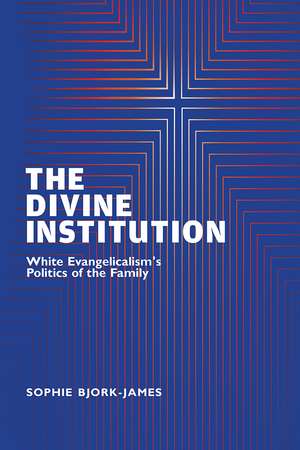The Divine Institution: White Evangelicalism's Politics of the Family
Autor Sophie Bjork-Jamesen Limba Engleză Paperback – 12 mar 2021
Preț: 266.57 lei
Nou
Puncte Express: 400
Preț estimativ în valută:
51.01€ • 55.39$ • 42.85£
51.01€ • 55.39$ • 42.85£
Carte indisponibilă temporar
Doresc să fiu notificat când acest titlu va fi disponibil:
Se trimite...
Preluare comenzi: 021 569.72.76
Specificații
ISBN-13: 9781978821842
ISBN-10: 1978821840
Pagini: 198
Ilustrații: 1 b-w image
Dimensiuni: 152 x 229 x 15 mm
Greutate: 0.29 kg
Editura: Rutgers University Press
Colecția Rutgers University Press
ISBN-10: 1978821840
Pagini: 198
Ilustrații: 1 b-w image
Dimensiuni: 152 x 229 x 15 mm
Greutate: 0.29 kg
Editura: Rutgers University Press
Colecția Rutgers University Press
Notă biografică
SOPHIE BJORK-JAMES is an assistant professor in the anthropology department at Vanderbilt University in Nashville, Tennessee. She is the coeditor of Beyond Populism: Angry Politics and the Twilight of Neoliberalism.
Cuprins
Table of Contents
Chapter 1: From Rules to a Relationship: The Transformation of US Christianity
Chapter 2: The Divine Institution and the Segregated Church
Chapter 3: Evangelicalism and a Strict Father Theology
Chapter 4: Same-Sex Attraction and the Limits of God’s Love
Chapter 5: Paternal Politics
Chapter 6: Losing (and Remaking) My Religion: The Transformation of White Evangelicalism from Within
Conclusion: White Evangelicalism in Trump’s America
Chapter 1: From Rules to a Relationship: The Transformation of US Christianity
Chapter 2: The Divine Institution and the Segregated Church
Chapter 3: Evangelicalism and a Strict Father Theology
Chapter 4: Same-Sex Attraction and the Limits of God’s Love
Chapter 5: Paternal Politics
Chapter 6: Losing (and Remaking) My Religion: The Transformation of White Evangelicalism from Within
Conclusion: White Evangelicalism in Trump’s America
Recenzii
"The Divine Institution advances a lively body of scholarship that leaves no doubt: racialization is a foundational problem in the anthropology of religion. [It] richly demonstrate[s] that racialization is not only an analytical problem; it is a lived problem that religious communities self-consciously negotiate."
"Anthropologist Sophie Bjork-James’s The Divine Institution presents a subtle, carefully crafted analysis that traces the intersectional relationships between faith, gender, sexuality, and politics within evangelical sub-cultures....It is in throwing light on these complex liminal spaces between hard categories of difference that Bjork-James’s book is especially impressive."
"What distinguishes Bjork-James’ work, quietly published this past spring, is the ethnographic intimacy of her observations. She shows how familial norms structure the ways evangelicals talk about race, homosexuality, “biblical” issues, and conversion. Bjork-James argues that understanding evangelical family values from the inside is the best way to make sense of white evangelical worlds."
"[The] book stand[s] out from other works on contemporary evangelicalism. As such, The Divine Institution works as a useful and informative starting point to think about the cultural and political divides between secular and evangelical America."
"Intersectionality is hard work, but Sophie Bjork-James applies it brilliantly to issues of race, faith, gender, and sexuality. Her study shows the ways in which race and racial supremacy structure and infect white evangelicalism's entire approach to men, women, and children."
"Sophie Bjork-James has taken on one of the central dilemmas of contemporary American culture, the stubborn association between white evangelical religious practice and profoundly conservative constructions of 'family values.' Using fine-grained ethnographic methods, she brings us close to white evangelicals and enables us to more fully appreciate the complexities of racial politics that unfold in their practices. "
Descriere
The Divine Institution provides an ethnographic account of how a theology of the family came to dominate a white evangelical tradition in the post-civil rights movement United States, providing a theological corollary to Religious Right politics.
